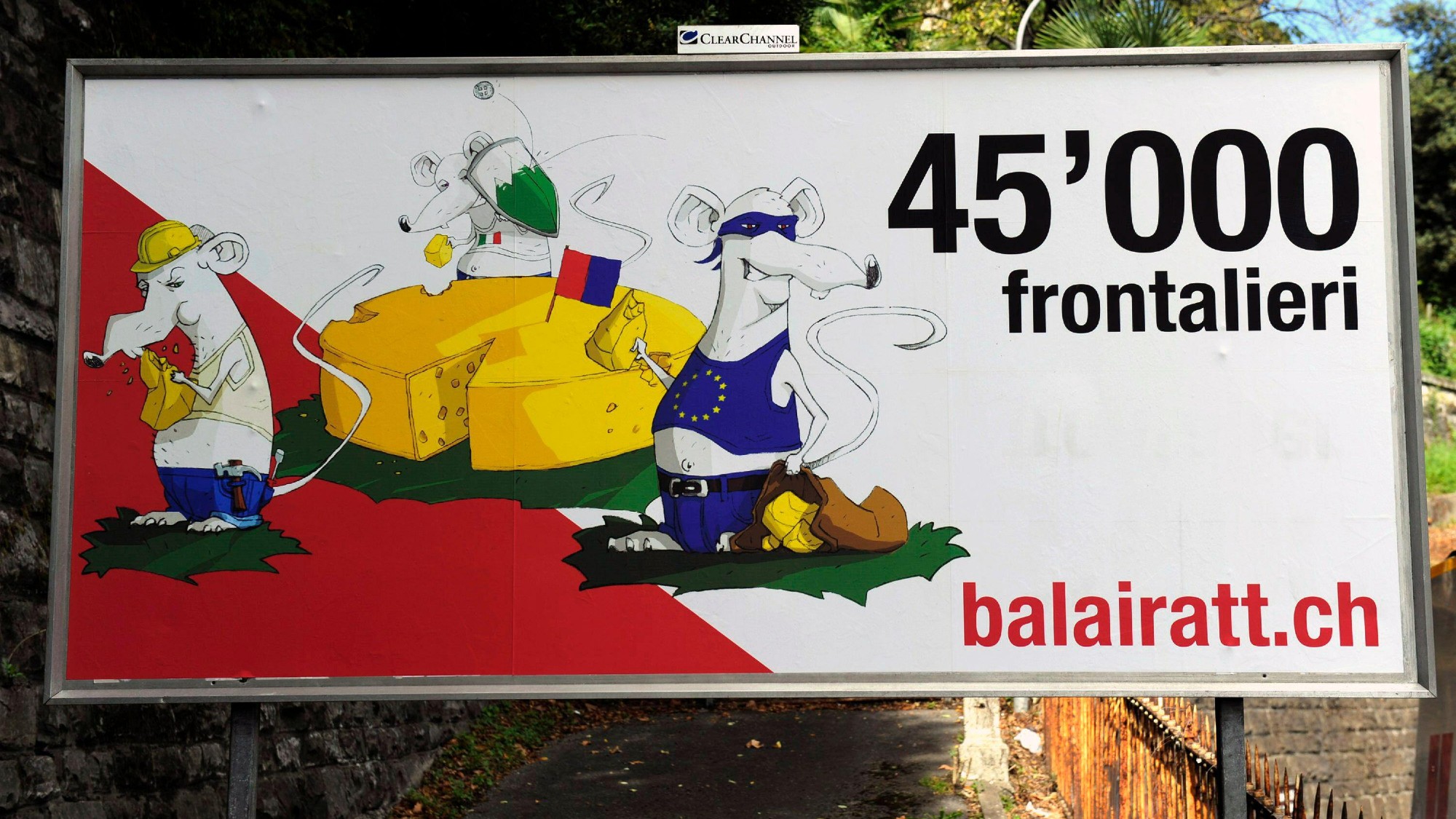The history of animal metaphors in propaganda
Images of rats, snakes and cockroaches have been used to dehumanise political enemies and minority groups

A free daily email with the biggest news stories of the day – and the best features from TheWeek.com
You are now subscribed
Your newsletter sign-up was successful
Gary Lineker has "apologised unreservedly" after he shared a social media post critical of Zionism that included an illustration of a rat.
After critics accused the BBC football presenter of promoting antisemitic imagery, Lineker insisted he hadn't noticed the rat, was unaware of its use in anti-Jewish propaganda and would "never knowingly share anything antisemitic".
Why are rats an antisemitic symbol?
Jews were frequently represented as a pestilent species like rats or cockroaches in Germany as the Nazi party rose to power. Der Stürmer, a weekly newspaper notorious for its virulent antisemitism, depicted a Nazi gassing Jewish 'rats' huddled around the base of a tree in one cover image from as early as 1927. "When the vermin are dead," the caption said, "the German oak will flourish once more.
The Week
Escape your echo chamber. Get the facts behind the news, plus analysis from multiple perspectives.

Sign up for The Week's Free Newsletters
From our morning news briefing to a weekly Good News Newsletter, get the best of The Week delivered directly to your inbox.
From our morning news briefing to a weekly Good News Newsletter, get the best of The Week delivered directly to your inbox.
The Nazis were not the first to use comparisons with rats to dehumanise targets. In 1909, the US satirical magazine Puck published a cartoon that depicted European immigrants arriving in New York City as a swarm of rodents. As recently as 2015, the Daily Mail ran a cartoon that showed refugees arriving in Europe from the Middle East and North Africa, with rats scurrying alongside them.
What other animals have been used?
Snakes are often associated with "malevolence", "slyness" and "hidden unfriendly intentions", said the Dangerous Street Project, and they've appeared in propaganda for decades. Following the Japanese attack on Pearl Harbor in 1941, US propaganda depicted Japan as a snake attacking the US, in the form of a bald eagle.
During the Rwandan genocide in 1994, Hutu media referred to Tutsis as "snakes" and "cockroaches". There have recently been comparisons between Palestinians and snakes on Israeli social media, in an effort to "dehumanise" them, said Turkey's Anadolu news agency.
In 2015, Katie Hopkins wrote a column for The Sun comparing migrants to cockroaches. The article, published hours before 800 people died when a fishing vessel packed with migrants capsized off the coast of Libya, drew widespread criticism, including from the UN's human rights chief.
A free daily email with the biggest news stories of the day – and the best features from TheWeek.com
While speaking about refugees during the 2016 US election campaign, Donald Trump quoted from the 1968 Al Wilson hit "The Snake", which includes the line: "You knew I was a snake before you took me in."
The comparisons can also be more general. In Hungary, Roma people have been described as animals that are "not fit to live among people", reported Der Spiegel. After Hamas's 7 October attacks, the Israeli defence minister said Israel was "fighting against human animals" and would "act accordingly".
Why are animal metaphors so common?
The depiction of enemies as subhuman dates as far back as ancient China, Egypt and Mesopotamia, author David Livingstone Smith told NPR. It re-emerges in the 18th century, when white Europeans "modestly placed themselves at the very pinnacle" of a hierarchy, with sub-Saharan Africans and Native Americans mostly seen as "soulless animals". This "dramatic dehumanisation" enabled "great atrocities" against marginalised groups.
Researchers from Stanford University, the University of California and Tel Aviv University found that acknowledging another person's "capacity to feel" encourages us to avoid harming them, said El Pais. Conversely, when we ignore or deny their ability to feel, it's easier to be abusive or violent towards them.
In another study, after researchers "subtly primed" participants to associate Black people with apes, said psychology researcher Allison Skinner-Dorkenoo on The Conversation, the participants became more likely to "tolerate aggressive, violent policing" of Black criminal suspects.
"Once someone is dehumanised", we "deny them the consideration, compassion and empathy" that we would usually give other human beings, relaxing our "instinctive aversion" to "aggression and violence" towards our fellow humans.
Chas Newkey-Burden has been part of The Week Digital team for more than a decade and a journalist for 25 years, starting out on the irreverent football weekly 90 Minutes, before moving to lifestyle magazines Loaded and Attitude. He was a columnist for The Big Issue and landed a world exclusive with David Beckham that became the weekly magazine’s bestselling issue. He now writes regularly for The Guardian, The Telegraph, The Independent, Metro, FourFourTwo and the i new site. He is also the author of a number of non-fiction books.
-
 Health insurance: Premiums soar as ACA subsidies end
Health insurance: Premiums soar as ACA subsidies endFeature 1.4 million people have dropped coverage
-
 Anthropic: AI triggers the ‘SaaSpocalypse’
Anthropic: AI triggers the ‘SaaSpocalypse’Feature A grim reaper for software services?
-
 NIH director Bhattacharya tapped as acting CDC head
NIH director Bhattacharya tapped as acting CDC headSpeed Read Jay Bhattacharya, a critic of the CDC’s Covid-19 response, will now lead the Centers for Disease Control and Prevention
-
 Journalists killed in Gaza: a chilling assault
Journalists killed in Gaza: a chilling assaultIn the Spotlight Anas al-Sharif and three of his Al Jazeera colleagues were targeted by the IDF
-
 What are the impartiality rules for BBC presenters?
What are the impartiality rules for BBC presenters?The Explainer News presenters and hosts of 'flagship programmes' must adhere to tougher guidelines than other staff and freelancers
-
 Substack's moderation crisis: the revolt over 'Nazi newsletters'
Substack's moderation crisis: the revolt over 'Nazi newsletters'Talking Points Platform facing 'greatest crisis in its short history' amid writer exodus over hate speech vs. free speech debate
-
 'Is this the sleaziest parliament of all time?'
'Is this the sleaziest parliament of all time?'Instant Opinion Opinion, comment and editorials of the day
-
 Stan Grant and Australian media’s racism reckoning
Stan Grant and Australian media’s racism reckoningfeature Trailblazing Indigenous Australian journalist stands down citing racist abuse and media failings
-
 BBC licence fee to increase by £3 from April
BBC licence fee to increase by £3 from AprilSpeed Read Announcement follows calls for the fee to be made voluntary
-
 National Geographic admits to being ‘racist’
National Geographic admits to being ‘racist’Speed Read Depiction of non-white Americans as exotic or savage propagates ‘every type of cliche’, says editor
-
 PewDiePie: YouTube star loses Disney deal after anti-Semitic video
PewDiePie: YouTube star loses Disney deal after anti-Semitic videoSpeed Read Swedish comedian Felix Kjellberg claims 'Death to all Jews' footage was a joke to show 'how crazy the modern world is'